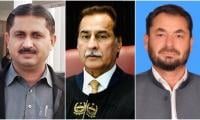PESHAWAR: Politicians, legislators and businessmen have stressed the need for a charter of economy for advocacy with the federal government to frame policies for promotion of manufacturing, trade and investment sectors.
Speaking at a meeting, they said such a joint charter was must for advocacy to frame policies for the economic sector which has suffered in the context of insecurity and instability prevalent in over the last decade.
The meeting was arranged by the Sustainable Development Policy Institute (SDPI) in collaboration with the Centre for International Private Enterprise (CIPE). Senator Nauman Wazir of the Pakistan Tehreek-e-Insaf (PTI) said the federal government’s claims of an economic turnaround were misleading.
He urged the government to set its growth targets closer to 11 percent, as the growth rate of 4.7 percent recorded in the previous fiscal year was insufficient to cater to our growing population.
The senator explained that the exporting sectors of the economy had been badly hit by the rising cost of utilities and poorly thought-out investment policies.He believed the country would be unable to service its foreign debts in the context of prevalent macroeconomic frailties.
Bushra Gohar, vice-president of the Awami National Party (ANP), felt that economic issues needed to be discussed more frequently and in a greater depth at the political level.She urged all relevant stakeholders to take a bigger notice of the prevalent internal and regional security environment within their economic analyses, especially in the context of Khyber Pakhtunkhwa as the economy of the province had suffered a lot due to instability.
The ANP leader also expressed concern over the low tax-to-GDP ratio, low-levels of investment and regional trade, and persistent trade and fiscal deficits.
Faisal Karim Kundi, provincial general secretary of the Pakistan People’s Party Parliamentarians (PPP-P), supported the call for drawing up a joint charter of economy to ensure consistency and continuity in the country’s economic policies and direction.
He stressed the need for helping farmers transition towards use of the latest agricultural techniques and technologies. He highlighted the problem of electricity shortages, particularly in rural areas of the province.
Professor Ibrahim of the Jamat-e-Islami emphasized the need for ensuring full implementation of the 18th Amendment in the allocation of resources to the provinces.
He expressed concern at the fall in direct taxes and rise in indirect taxes under current fiscal regime of the country.
The JI leader also called for the passage of conflict-of-interest legislation to ensure that parliamentarians did not use public positions for private benefits.
Stressing the importance of promoting business for growth of the economy, Ghulam Ali of the Jamiat Ulema-e-Islam-Fazl (JUI-F), said that local businesses were being burdened by multiple taxes and other constraints that had increased the cost-of-doing business.
Zahidullah Shinwari, president of the Sarhad Chamber of Commerce and Industry (SCCI), its ex-chief Haji Afzal also spoke on the occasion. They called on the federal government to facilitate local investors along the same lines as foreign investors.
Adnan Jalil, a former vice-president of the Federation of Pakistan Chambers of Commerce & Industry (FPCCI), questioned the role of the Trade Development Authority of Pakistan (TDAP) in the province.
Dr. Vaqar Ahmed, Deputy Executive Director at SDPI, outlined the economic reform priorities for elections 2018 that SDPI and CIPE had framed in consultation with representatives of all political parties, representatives of the FPCCI, SCCI and the Pakistan Business Council.
Saud Bangash, Resident Director of the Pakistan Business Council, Mazhar-ul-Haq of the Chamber of Small Exporters and Businesses, and Abdur Rauf Shah, President of the Bannu Chamber of Commerce & Industry also spoke at the meeting.
This representational image shows the hands of an incarcerated person. — AFP/FileJAMRUD: A man was arrested after a...
An old man covering himself with an umbrella during rain in Peshawar. — APP/FilePESHAWAR: Two more people were...
Azad Jammu and Kashmir Prime Minister Chaudhry Anwar-ul-Haq. — X/@KashmiriTales/FileISLAMABAD: Prime Minister Azad...
A police official stands guard outside the Peshawar High Court in this file photo. — APP/FilePESHAWAR: The Peshawar...
Advisor to the Prime Minister on Kashmir Affairs and Gilgit Baltistan Mr. Qamar Zaman Kaira addresses an important...
A representational image showing ambulances parked at an incident site. — Facebook/Rescue 1122...







